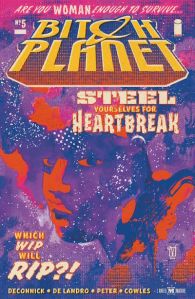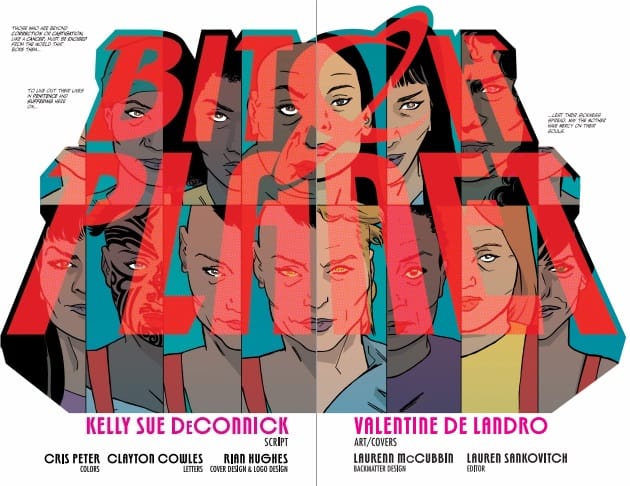
Pages 9-10 Overview
With the turn of a page, the issue takes us back to the conversation between Father Josephson and Makoto “Mack” Maki. Gone are the assistant and the video screen. Tonally this scene is more intimate and more subdued. Emphasis has to be on the emotional shifts, and they are subtle. Maki keeps his internal thoughts and emotions tightly guarded, and Valentine De Landro has to subtly show them and cannot risk distraction.
These pages show a literary communion. Josephson’s goal, by sharing drinks, is to bring them together in service of his plans for the ACO team and the financial betterment of the Duemila conference. However, at every panel break, we see the tension of the communion. Maki doesn’t want to be involved, and it is only through manipulative coercion that Josephson succeeds. 
Page 9
Cell 1: Josephson is foregrounded though we see only his torso. He’s taking up space, being afforded, visually, a casual importance. He pours two drinks, an act of communion to connect on the issue at hand. Maki sits on the couch behind him, visually much smaller, facing away from Josephson slightly. Even in this long shot De Landro expresses Maki’s worry through the tilt of his eyebrows. He says, “Six weeks isn’t a lot of time.”
Cell 2: Josephson now stands next to Maki, towering over his seated form, another visual representation of his power. He hands him the drink and attempts to reassure Maki by belittling the women, saying it’s plenty of time to prepare since they don’t have jobs. His condescension arouses a rebuttal from Maki in Cell 3 who points out rather diplomatically only that they are prisoners. Though this is all he says, the fact that he says it at all indicates his upset at the Father’s words. Implied in his reply is the fact that these women did not choose not to have jobs.
Josephson doesn’t miss the nuance in Cell 4. “They made choices and they live with the consequences, just like the rest of us.” He goes on to compare their choices to his decision to work more than golf and consequently getting a paunch. His extreme societal privilege is evident in his reduction of choice and consequence. He gives no recognition of the inequities that force choices, remove alternatives. Nor does he acknowledge instances when choice simply wasn’t there. Furthermore, he gives not even a moment’s thought to whether the choices have fair consequences nor who created those consequences.
The smirk he wears in Cell 5 to deliver his “Consequences, follow?” drips with the arrogant privilege of a man who erroneously believes he has earned his luxurious “consequences” of power and money from a  series of correct choices. Maki’s response in Cell 6 is one of deliberate deference. He raises his glass, let’s a moment pass to swallow what he might otherwise like to say, indicated by the ellipsis, and then merely agrees, being sure to address Josephson as “Father.”
series of correct choices. Maki’s response in Cell 6 is one of deliberate deference. He raises his glass, let’s a moment pass to swallow what he might otherwise like to say, indicated by the ellipsis, and then merely agrees, being sure to address Josephson as “Father.”
I suspect Maki actually would have a lot to say. How? His red tie, which matches him chromatically to the women on the ACO team, who are wearing the same color red. De Landro has marked him clearly, and his sympathies will become more obvious and understandable on later pages.
In Cell 7, Maki clarifies his position, saying that it would be impossible to build a facility off-world in 6 weeks. Maki is drawn taking up as little space as possible, his knees tightly drawn together in the full body shot. Josephson appeals first to his vanity in Cell 8, his ignorance about Maki and his culture again clearly displayed: “I thought you were the best…?”
Page 10
Cell 1: Maki, in response, laughs off the compliment (as the disempowered are taught to do), deflecting to dodge being pulled in to something he cannot or does not want to do. His word choice is important: “I appreciate the faith you have in me, but I know my limits.” Faith connotes religion, and thus it directly references the quasi-religious society the Fathers lead.
Josephson, in his response, boisterously (and perhaps drunkenly) dismisses Maki’s answer with a joking gestural and verbal “WHOOSH!” His dismissiveness again borders on the condescending, though he appears to be friendly on the surface.

In the background is a piece of artwork that is too abstract to identify, but it consists of vivid blues, dark vertical linework, and a smaller area of mauve at the bottom. The effect is to add chaos and tension to the dialogue here, emphasizing that despite the jovial interplay, there is deep conflict underneath, especially in Maki’s decision-making. He is attempting to wiggle his way out of what he knows is a trap. His verbal maneuvers are skillful, but Josephson has the power. While the backgrounds up to this point have been simple color gradients, here we have a visual representation of the rising action within the scene.
 Cell 3: Maki stands up, attempting to decline the offer finally and end the conversation. In Cell 4, he has turned to leave when Josephson drops the final card of his stacked deck: “You could go. Visit the site.” The line indicating the corner of the room emphasizes the play that’s being made here–this is not communion after all; it is competition. Josephson will win. Maki is given agitation lines around his head and placed in front of the white box that is the door. It indicates a realization or epiphany–Josephson knows?
Cell 3: Maki stands up, attempting to decline the offer finally and end the conversation. In Cell 4, he has turned to leave when Josephson drops the final card of his stacked deck: “You could go. Visit the site.” The line indicating the corner of the room emphasizes the play that’s being made here–this is not communion after all; it is competition. Josephson will win. Maki is given agitation lines around his head and placed in front of the white box that is the door. It indicates a realization or epiphany–Josephson knows?
I’m not sure what kind of stigma having a family member on Bitch Planet carries. I suspect it’s sizable, especially for the patriarch who failed to raise a compliant daughter. So it’s understandable that Maki would feign ignorance initially, as he does in Cell 5. The rare close-up of Maki gives a nuanced look at his emotional state: surprised, concerned, fearful. But also perhaps a bit of hope?
In Cell 6, Josephson tries to shut down the feign and dodge Maki is attempting. Josephson is crafty. He knows this is an enticement beyond any payment or promise of notoriety. He indicates neither of them have time to be “coy.” The term is one usually assigned to women, and it labels much of Maki’s mannerisms in the conversation: he’s being femininely submissive. He has to be with Josephson. But it is a clear recognition that the kyriarchy (a set of connecting social systems built around domination, oppression, and submission) isn’t just about men and women. It’s also about wealth, race, and privilege.
In Cell 7, we see just how off-kilter the idea of seeing his daughter at the ACO has made Maki. He’s visually befuddled, glasses off his face at a slant, eyes wide open. At the same time, Josephson finishes his drink. He’s won this “communion” and gulps the remaining liquor as punctuation on that fact.
In the pages closing Cell 8, Josephson is pictured in close-up. We see his drunken smugness, a trickle of the alcohol messily left on his lip like the trickle of blood on the mouth of a vampire post-feeding. His predatory trap has ensnared Maki completely. “You could see her,” he states simply, clarifying to the reader what has already been suggested and ending the competition. 

